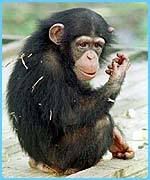 Excellent Op-Ed piece in The New York Times, "Something Wild," by Charles Siebert examines human interaction with chimpanzees in light of the horrific attack in Stamford, Conn., last month — in which a pet chimp named Travis mauled a woman, robbing her of her hands, eyesight and much of her face, and possibly causing brain damage.
Excellent Op-Ed piece in The New York Times, "Something Wild," by Charles Siebert examines human interaction with chimpanzees in light of the horrific attack in Stamford, Conn., last month — in which a pet chimp named Travis mauled a woman, robbing her of her hands, eyesight and much of her face, and possibly causing brain damage.Siebert theorizes that domesticated chimps are prone to psychological problems, "Wild chimps “recruited” by poachers for entertainment watch as their mothers are gunned down — the only way a chimp mother would ever relinquish a child.
Chimps born in captivity are spared that experience, but they suffer the same premature separation from their mothers, isolation from their normal social groups and often mistreatment from trainers and keepers, all traumatic events that have been shown to cause deep psychological scarring and, as in human beings, can lead an animal to overreact to the slightest stimuli."
He recounts the heartbreaking tale of Lucy, raised from infancy to age 10 as if she were a human child. When she reached sexual maturity and became difficult to handle, her "parents" sent her to a place that was the complete opposite of what she knew, a refuge that reintroduces captive chimps into the wild. Lucy refused to socialize with the other chimps, to climb trees, forage for food, make nests. She took to waiting beneath trees for the others’ crumbs to fall. Eventually, Lucy’s skeleton was found near the shores of the island refuge.
Read more
